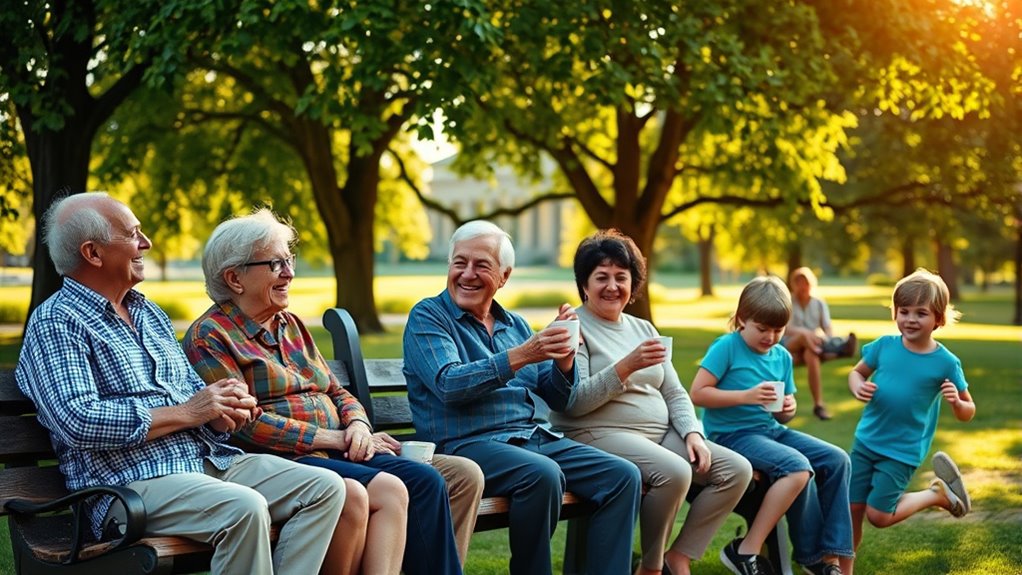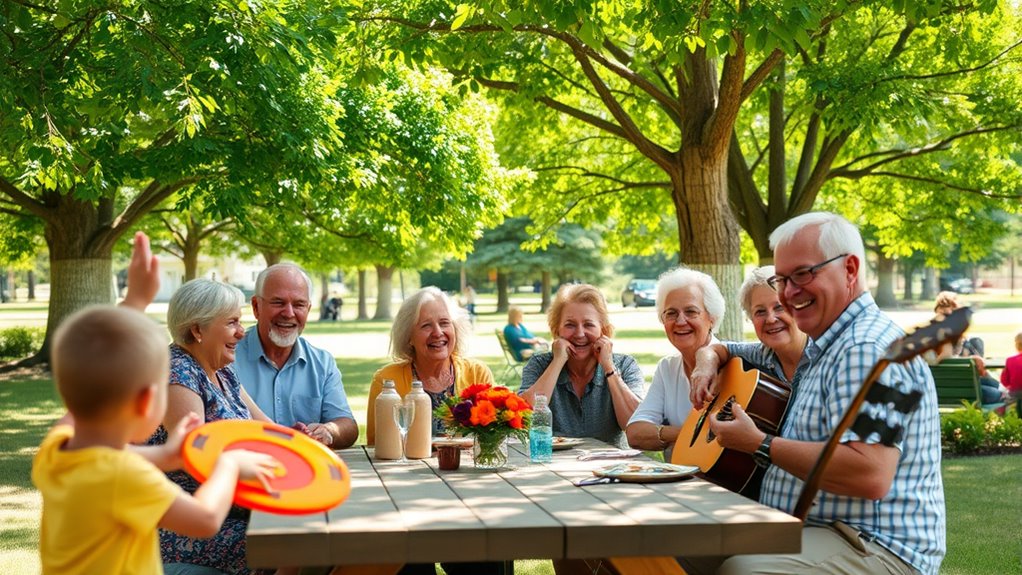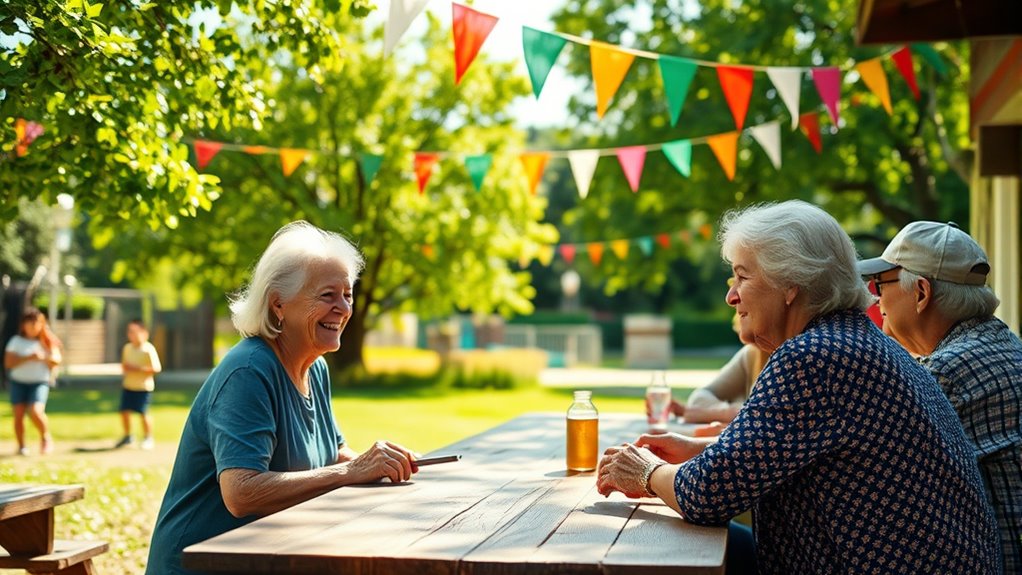Building strong social connections boosts your immune system, reduces stress, and encourages healthy behaviors like exercise and better sleep. Loneliness increases stress hormones and weakens your immunity, raising the risk of heart disease and cognitive decline. Engaging in community activities, groups, or volunteering can deepen bonds and promote well-being. Overcoming barriers like shyness or lack of time is key. To discover practical ways to strengthen your social life, keep exploring how these strategies can positively impact your longevity.
Key Takeaways
- Strong social bonds boost immune function and reduce inflammation, contributing to longer, healthier lives.
- Social engagement lowers stress hormones like cortisol, enhancing immunity and reducing disease risk.
- Participation in community activities and group exercises promotes mental and physical health, supporting longevity.
- Chronic loneliness increases stress and weakens immunity, significantly raising risks of heart disease and cognitive decline.
- Building meaningful relationships through shared interests and regular interactions fosters resilience and extends lifespan.
The Science Behind Social Bonds and Health

Research shows that strong social bonds can substantially improve your health and longevity. When you build meaningful relationships, your body responds positively at a biological level. Studies reveal that social connections boost your immune system, helping you fight off illnesses more effectively. They also lower inflammation, which is linked to chronic diseases like heart disease and diabetes. Engaging with others releases feel-good hormones such as oxytocin and endorphins, reducing stress and improving mood. These physiological benefits translate into longer, healthier lives. Moreover, social bonds encourage healthier behaviors, like regular exercise and better diet choices. Maintaining healthy relationships also involves understanding separation and children to ensure emotional stability. In essence, your social interactions do more than just enrich your life—they activate complex biological processes that promote your overall health and extend your years.
How Relationships Influence Stress and Immune Function

Your relationships can markedly lower stress levels, which helps keep your body’s defenses strong. When you feel supported, your immune system responds more effectively, making it easier to fight off illnesses. Conversely, loneliness can weaken your immune function and leave you more vulnerable to health problems. Maintaining positive social connections provides necessary emotional support, which is crucial for overall health and well-being.
Social Bonds Reduce Stress
When you maintain strong social bonds, your body responds by lowering stress levels and boosting immune function. Having close relationships provides emotional support, helping you manage daily challenges more effectively. This support reduces the release of stress hormones like cortisol, which, when elevated, can impair your immune response. Feeling connected and supported creates a sense of safety, calming your nervous system. As a result, your body doesn’t have to work overtime to handle stress, allowing your immune system to function at its best. Strong social ties also encourage healthier behaviors, like better sleep and regular activity, further reducing stress. Additionally, the physical health benefits of social connections are linked to projector technology, which can improve overall well-being. Overall, nurturing relationships isn’t just good for your mental health—it plays an essential role in keeping your stress levels in check and supporting your body’s defenses.
Support Boosts Immune Response
Strong social support doesn’t just improve your mood—it actively enhances your immune response. When you feel connected, your body produces fewer stress hormones like cortisol, which can weaken immunity. This reduction allows your immune system to respond more effectively to threats like infections and illnesses. Supportive relationships also promote behaviors that boost immunity, such as better sleep and healthier eating habits. Research shows that people with strong social ties tend to have higher levels of natural killer cells, critical for fighting off viruses and cancer cells. Maintaining close connections can help your body stay resilient against illness. Additionally, social interactions can increase immune cell activity, further strengthening your defenses.
Loneliness Impairs Defense
Loneliness can substantially weaken your immune defenses by increasing stress levels and disrupting your body’s natural balance. When you feel isolated, your body produces more cortisol, a stress hormone that suppresses immune function. Elevated cortisol levels hinder your ability to fight off viruses and bacteria effectively. Chronic loneliness keeps your immune system in a constant state of alert, exhausting your body’s resources and making you more vulnerable to illness. Additionally, loneliness can negatively affect sleep quality, further impairing immune responses. Without strong social connections, your body struggles to regulate inflammation and recover from stress. This ongoing stress response can also disrupt your body’s natural balance, making it harder to maintain optimal health. Ultimately, persistent loneliness doesn’t just affect your mood—it directly diminishes your ability to defend against disease, emphasizing how essential social bonds are for your health and longevity.
The Impact of Loneliness on Longevity

Research shows that feeling lonely can substantially shorten your lifespan, affecting both mental and physical health. When you’re lonely, your stress levels rise, and your immune system weakens, making you more vulnerable to illnesses. Chronic loneliness is linked to higher risks of heart disease, depression, and cognitive decline. It can also lead to unhealthy behaviors like poor diet and lack of exercise, further harming your health. Recognizing the impact of loneliness on longevity emphasizes the importance of building meaningful connections. Staying socially engaged isn’t just good for your mood—it’s essential for your survival. Additionally, understanding tableware and its role in social gatherings can foster a sense of community and connection, which are vital for longevity.
Community Engagement and Its Benefits

Engaging with your community offers a powerful way to boost your well-being and extend your lifespan. When you participate in local events, volunteer, or join clubs, you create meaningful connections that foster a sense of belonging. These activities provide social stimulation, reduce stress, and promote mental sharpness. Community involvement also encourages physical activity, which benefits your overall health. Feeling connected to others gives you a sense of purpose, combating feelings of isolation. Plus, supporting community initiatives can boost your mood and resilience. Over time, these positive interactions build a network of support that helps you navigate life’s challenges more effectively. Developing social connections is a key factor in enhancing your overall well-being and longevity. By actively engaging, you not only enrich your life but also lay a foundation for longer, healthier years.
Building and Maintaining Strong Connections

Building and maintaining strong connections require intentional effort and genuine communication. You need to prioritize quality over quantity, making time for meaningful interactions. Be honest and open, showing authentic interest in others’ lives. Listening actively and offering support fosters trust and deepens bonds. Remember, consistency matters—regular check-ins help keep relationships alive. Additionally, sharing interests such as electric bikes can create common ground and strengthen bonds.
Social Activities That Promote Well-Being

Engaging in group exercise, volunteering, or joining social clubs can boost your well-being and strengthen connections. These activities offer opportunities to stay active, give back, and meet new people. By participating, you enhance both your health and your social circle. Incorporating social engagement strategies can further deepen your sense of community and support mental health.
Group Exercise Benefits
Participating in group exercise offers more than just physical health benefits; it also boosts your social well-being. When you join classes or team activities, you create opportunities to connect with others who share your interests. These interactions can reduce feelings of loneliness and foster a sense of community. Plus, exercising with others keeps you motivated and accountable, making it easier to stick with your routines. The social aspects of group workouts promote mental health and enhance your overall happiness. Engaging regularly in such activities can lead to lasting friendships and a stronger support network. Additionally, choosing vetted programs or trainers ensures that you receive safe and effective guidance during your activities.
Volunteering Opportunities Abound
Volunteering offers a powerful way to strengthen your social connections while supporting your well-being. When you volunteer, you meet new people who share your interests and values, creating meaningful relationships. Engaging in community projects or helping at local shelters gives you a sense of purpose and belonging. These activities also boost your mental health by reducing stress and combatting feelings of loneliness. Plus, volunteering often involves teamwork, which fosters trust and camaraderie. You’ll find that giving your time not only benefits others but also enriches your life. The more you get involved, the more opportunities you’ll have to connect with diverse groups. Over time, these social bonds can contribute considerably to your overall happiness and longevity.
Social Clubs and Groups
Joining social clubs and groups provides a structured way to build meaningful connections and enhance your well-being. These groups offer opportunities to share interests, learn new skills, and stay active. When you participate regularly, you create a sense of belonging that boosts your mental health and reduces loneliness. Plus, engaging in group activities can motivate you to stay consistent and committed, making social interaction a natural part of your routine. Whether it’s a book club, gardening group, or fitness class, these activities foster friendships and support networks.
- Connect with people who share your passions
- Stay mentally and physically active
- Build a support system that promotes longevity
Overcoming Barriers to Social Connection

Despite the many benefits of social connection, various barriers can make it challenging to build and maintain relationships. You might feel shy, anxious, or unsure of how to start conversations, which can hold you back. Time constraints and busy schedules also limit opportunities to connect with others. Sometimes, past experiences or fears of rejection create emotional barriers that seem hard to overcome. To break through these obstacles, start small—reach out to a friend or join a local activity that interests you. Practice active listening and stay open to new experiences. Remember, building social connections takes patience and persistence. By gradually pushing past these barriers, you’ll find it easier to form meaningful relationships that boost your well-being and longevity.
Practical Tips for Enhancing Your Social Life

Enhancing your social life involves taking intentional steps to connect more deeply with others. You can start by prioritizing quality time over quantity—focus on meaningful conversations rather than just socializing for the sake of it. Reach out regularly to friends and family, even if it’s just a quick message or call. Be open to new experiences and join groups or activities that match your interests. Building new connections often requires stepping outside your comfort zone.
- Schedule regular catch-ups with loved ones
- Join clubs or hobby groups to meet like-minded people
- Practice active listening to deepen your relationships
Frequently Asked Questions
How Does Social Media Impact Real-Life Social Bonds and Longevity?
You might wonder how social media affects your real-life relationships and lifespan. It can strengthen bonds by keeping you connected across distances, but it also risks replacing face-to-face interactions with superficial online ones. If you’re mindful, social media can enhance your social support network, which boosts your mental and physical health. However, excessive use or online conflicts can harm your well-being and potentially shorten your lifespan.
Can Virtual Relationships Provide the Same Health Benefits as In-Person Connections?
Your virtual relationships can feel as intense as a thunderstorm, but they often don’t match the depth of in-person bonds. While online connections can boost your mood and provide support, they lack the full range of nonverbal cues and physical touch that strengthen real-world relationships. So, although virtual ties are valuable, they usually can’t fully replicate the emotional and health benefits of face-to-face interactions.
What Role Do Cultural Differences Play in Social Connection and Lifespan?
You might find that cultural differences shape how you form social connections and influence your lifespan. In some cultures, close-knit family ties and community involvement are highly valued, boosting your well-being and longevity. Other cultures might emphasize individualism, which can affect your social networks differently. Recognizing these cultural factors helps you understand that your social habits and health outcomes are deeply rooted in your cultural context, guiding you toward healthier social choices.
Are There Specific Age Groups That Benefit More From Social Engagement?
You might find that younger age groups benefit from social engagement by building essential skills and emotional resilience early on. As you grow older, staying socially active helps combat loneliness and cognitive decline. Older adults especially gain from meaningful interactions, which can improve mental health and even extend lifespan. So, regardless of your age, maintaining social connections is vital, but the specific benefits may vary depending on your stage of life.
How Does Socioeconomic Status Influence Access to Social Opportunities?
Imagine a vibrant garden where some plants have lush soil, while others struggle in rocky patches. Your socioeconomic status shapes the soil you grow in, influencing access to social opportunities. If you’re in a privileged position, you find it easier to join community events, networks, and activities. Conversely, limited resources can make it harder to connect, impacting your ability to reap the benefits of social engagement and enriching your life.
Conclusion
By strengthening your social connections, you can boost your health and extend your life. Did you know that people with strong social ties are 50% more likely to live longer than those who feel lonely? So, make time for friends, join community activities, and nurture your relationships. Building meaningful bonds isn’t just good for your happiness—it’s a smart way to improve your overall well-being and enjoy a longer, healthier life.









